Today it is more important than ever to grab the attention of your target customers.
It’s more challenging than ever too.
The internet gives you a direct line into your customers lives.
But you are competing with everyone else who is trying to do the same thing!
Being able to run effective attention-grabbing ads often separates the winners from the losers in competitive markets.
If you don’t feel like you’re the right “type” of person to create amazing ads don’t worry.
Many business owners think they will need to spend a ton of money on professionals to create video, audio, images or ad copy.
Now you can definitely spend a lot of money on ad creation and get great results.
Ads DO require some creativity.
BUT…
There are some scientifically proven ads formulas that can help anyone make better ads.
In fact, there are just six major categories that all ads fall into.
Once you know and understand the different ways they appeal and impact an audience, you’ll be able to start creating better ads yourself.
First, let’s take a look at some quick research that shows how effective these templates are.
Table of Contents
Scientifically Proven Templates for Winning Ads
The story of how the science of ads was uncovered begins with an Israeli scientific study in 1999.
The Fundamental Templates of Quality Ads was published in the Marketing Science journal in 1999.
While a few industry professionals saw its value, it went mostly unnoticed by the vast majority of marketers.
I didn’t know about it myself until I read Made to Stick by Chip and Dan Heath.
In The Fundamental Templates of Quality Ads study looked at 200 award-winning ads and closely analysed them for similarities.
What the researchers found was that 89% of those 200 advertisements fit into 6 categories or ‘templates’.
This showed the researchers that what made a good ad effective is something that can be identified, measured and most importantly taught.
If you can understand these 6 proven and effective templates, you can start creating more effective ads of your own!
6 Scientifically Proven Ad Templates
If you can understand these 6 templates, you will understand the fundamentals of what makes great ads work.
No need to reinvent the wheel, just use what you know already works.
1) Extreme Consequences
The extreme consequences template leverages the very real and powerful human emotion of fear to make your advertising message to stick.
Ads created in line with this template take one of two approaches to sell a product:
- An exaggeration absurd representation of the positive impact of the product (positive consequences)
- The negative effect of not using the product or service (implied negative outcome).
There are many ads that use extreme consequences and fear, just like this Gameboy advertisement.
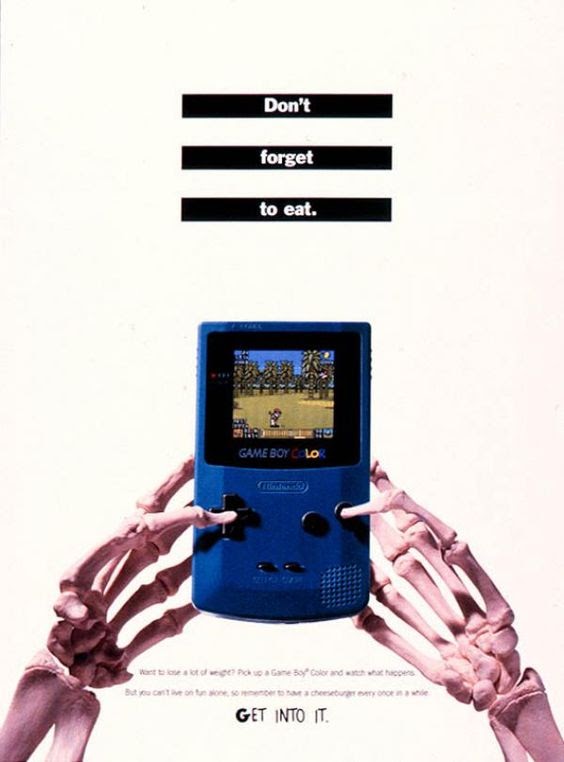
The implication here is that the game system is so good (and addictive) that you might forget to eat and die as a result.
This is obviously an extreme consequence.
Normally you don’t think of death when you think about Gameboys.
But the fact that the ad is over the top absurd creates humour around this extreme consequence and catches your attention.
It works the other way around too highlighting or exaggerating the negative attributes of an action to convince you to change your behaviour.
A great example of this is the Greenpeace campaign against Nestle’s use of palm oil in their Kit Kat bars:

They are amplifying the negative impact of this ingredient making the consequence obvious to the consumer.
These advertisements are very effective at making your audience stop and think about your offer and are highly effective at grabbing attention in crowded marketing spaces.
2) Extreme Situations
Closely related to the extreme consequences template is the extreme situation template.
This ad places the user or the product in an extreme situation to highlight and accentuate its key attributes.
Car companies commonly use this tactic, as shown in the Ford ad below:
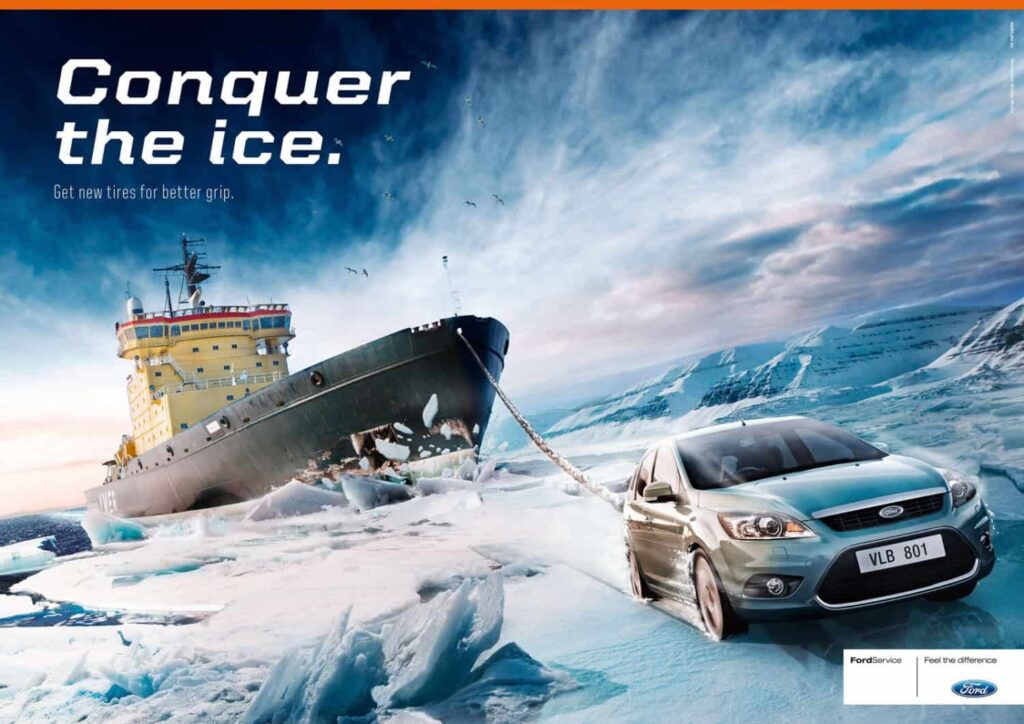
In this case, this Ford car is placed in a completely absurd and exaggerated situation in order to highlight the new features of the vehicle that give it traction on icy surfaces.
Here is another great example of this ad type from Bose:
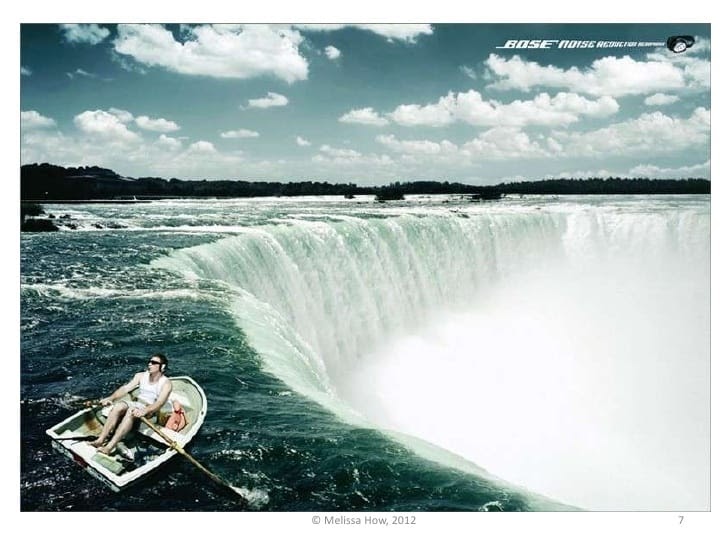
Here, the noise-cancelling attributes of the product are exaggerated, by placing the user in an extremely loud (and dangerous) situation that they are oblivious to.
It is the absurdity of the situation in both advertisements that both highlights the inherent attributes of the product while introducing some humour that grabs your attention.
3) Pictorial Analogy
This template is the perfect way to communicate the inherent qualities of a product without using loads of text.
Some kind of visual analogy that ties together the benefits of the product and a real-world situation.
This works best when the product is well known and its benefits are obvious, but you still want to grab attention.
The Nescafe ad is another great example of a pictorial analogy:

The clear link is made between coffee and the morning by turning the top view of a coffee mug into an alarm clock.
This accentuates the key attribute of coffee as an energizing drink for the morning without the need to use text or slogans.
As you can see, pictorial analogies are a powerful way to send complex messages in a visual form.
This is perfect for social media marketing where you may only get seconds of attention as a user scrolls on past!
4) Competition
Pretty much every industry is a competitive space, with many similar products competing for attention.
While most advertising is about showing the best of your product, sometimes you can take some playful jabs at the competition and that is what this template is all about.
Some of the most famous ads using this template are from the Mac vs. PC campaign:
On the surface, very little is communicated in this ad, but it is all about the analogy.
PC’s are represented by a nerdy, conservatively dressed man, while the Mac is a younger, cooler, more casually dressed man.
Without having to say anything at all, this ad effectively communicates an idea about the products and shows the Mac in a much more positive way.
The old Mac vs PC commercials did a great job of highlighting and comparing the differences between the two companies and their products.
5) Interactive Experiments
These ads used to be big in print advertising, particularly glossy magazines.
They often required you to bend a page or modify the ad in some way to engage the audience and get them interacting with your ad at a level beyond a quick glance.
These are starting to come to digital advertising in a big way, as shown by the new option for interactive Facebook ads:
As you can see, each of these ads allows for some kind of interaction from the audience.
These ads are far more engaging than regular ads and if you properly grab someone’s attention, you will keep it on average for longer while they ‘play’ with the interactive features of your ad.
6) Dimensionality Alteration
These ads alter your perspective on the product in relation to its environment.
In basic terms, they make someone stop and think for a second, which is great for drawing attention to your product!
This isn’t the best digital example, but here’s a great example of an optical illusion and perspective to create a powerful message about a product:
This ad relies on the perspective of someone looking down on the ad.
This kind of perspective shift draws in the viewer.
This is another example that has been used effectively online:
It takes a moment to realize that the sailors have formed a ship, but this is definitely an appealing illusion and also conveys key messages surrounding teamwork.
With this technique, you can create ads that make potential customers stop, think and smile.
They are also VERY shareable which is a great way to amplify your marketing efforts.
Now You Know What Works
Using these templates as a basis, you can come up with highly effective ads to promote your business online.
There will always be a creative element to advertising, but the science about the techniques and templates that work is clear and you should use it.
The best way to figure out exactly which ad template is going to work best for your business is to get out there and test them out for yourself!
[optin-monster slug=”ak65wqty42nvc6p0be1g” followrules=”true”]



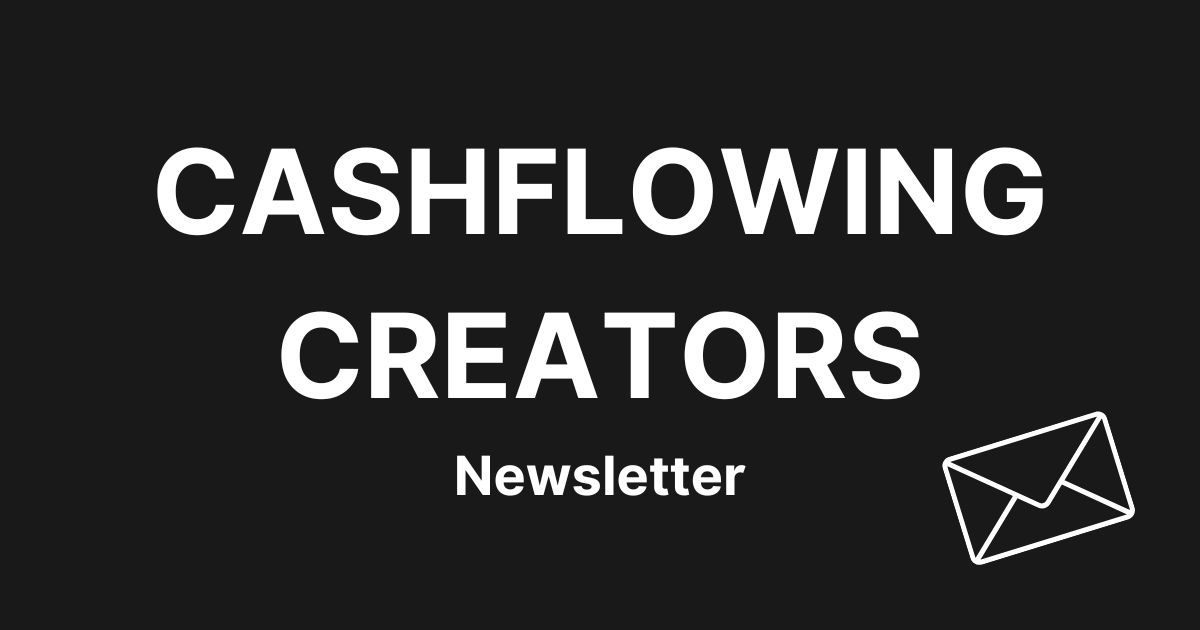
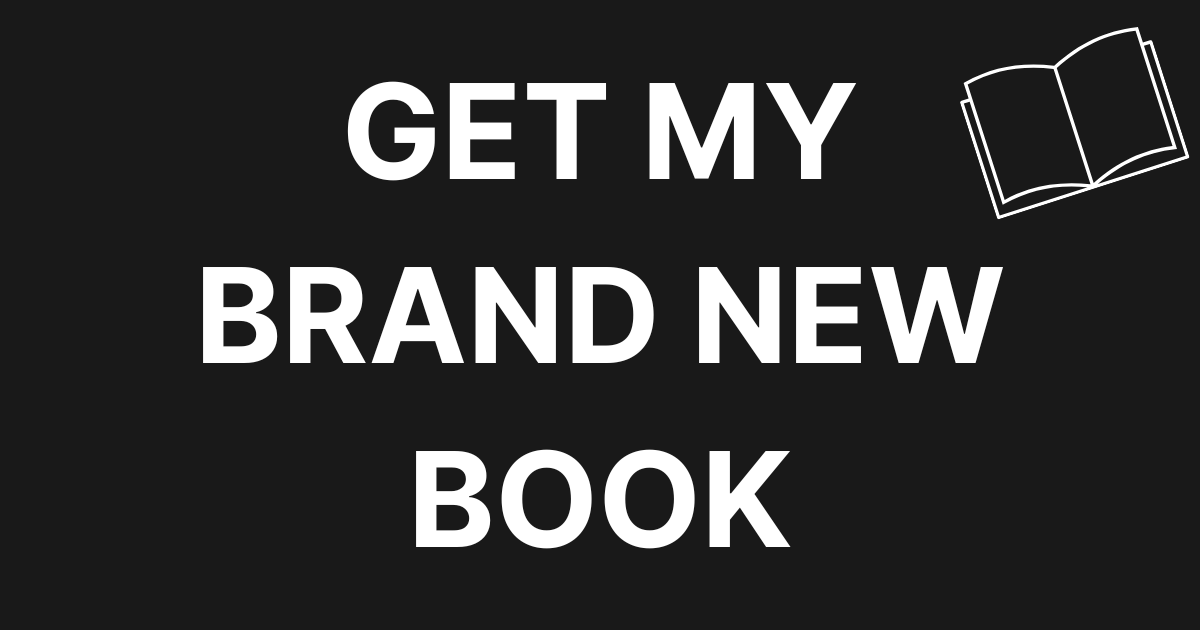
0 Comments